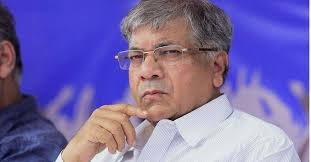The Maharashtra reunion that may not happen: Ambedkar grandsons fall out over dalliance with Shinde Sena

Maharashtra’s political landscape has once again witnessed a dramatic turn as the grandsons of Dr. B.R. Ambedkar, the architect of the Indian Constitution, find themselves at odds. The anticipated “reunion” of the Ambedkar brothers — Prakash Ambedkar, leader of the Vanchit Bahujan Aghadi (VBA), and Anandraj Ambedkar, leader of the Republican Sena — appears to have collapsed following Anandraj’s recent decision to form an alliance with Eknath Shinde’s Shiv Sena. This move has not only widened the rift between the brothers but also sparked intense debate about ideological fidelity, political strategies, and Dalit representation in Maharashtra.
A Reunion That Seemed Possible
Just a few months ago, talks of a family reunion between the Ambedkar brothers were circulating in political circles. Inspired by the reconciliation between the Thackeray cousins — Uddhav and Raj — Anandraj had expressed interest in bridging gaps with Prakash. The idea of a united Ambedkar front carried significant weight, particularly for Dalit voters in Maharashtra, who hold both historical and emotional ties to the Ambedkar legacy.
Prakash Ambedkar, known for his sharp criticism of the BJP and RSS, initially appeared open to discussions, as such a reunion could strengthen Dalit politics. However, the sudden announcement of Anandraj’s alliance with Eknath Shinde’s faction of the Shiv Sena shattered these hopes.
Anandraj’s Political Gamble
Anandraj Ambedkar’s alliance with Shinde Sena is being seen as both a tactical and ideological gamble. He argues that his move aims to secure better representation for Dalits and backward communities in local governance. With the upcoming Brihanmumbai Municipal Corporation (BMC) elections, the Republican Sena hopes to leverage Shinde’s ruling alliance to gain a foothold in civic politics.
In public statements, Anandraj has emphasized that his decision is not about compromising Ambedkarite ideology but about ensuring political relevance. “If we want to bring change, we must engage in practical politics,” he reportedly said. For him, aligning with Shinde Sena is a way to counter the dominance of Uddhav Thackeray’s Shiv Sena (UBT) and to gain resources for his party’s outreach.
Prakash Ambedkar’s Strong Rebuttal
Prakash Ambedkar has been unequivocal in rejecting his brother’s move. Calling the alliance a betrayal of the principles laid down by Mahatma Phule, Shahu Maharaj, and Dr. Ambedkar, Prakash accused Anandraj of aligning with forces that undermine the Constitution and democratic values. He views Shinde Sena’s proximity to the BJP and RSS as fundamentally incompatible with Ambedkarite politics.
Speaking at a public event, Prakash said, “This is not just a political alliance; it is a compromise with the very ideology our grandfather stood for. We cannot align with forces that aim to dilute the Constitution.” His sharp criticism has left little room for reconciliation, at least in the near future.
Impact on Dalit Politics in Maharashtra
The Ambedkar brothers have long been seen as torchbearers of Dalit representation in Maharashtra. However, their separate political journeys have often split the Dalit vote, allowing larger parties like the BJP, Congress, and Shiv Sena to dominate the political narrative. The recent fallout further deepens these divisions.
Anandraj’s alliance with Shinde Sena is viewed as a calculated attempt by the ruling coalition to expand its outreach to Dalit voters. For Shinde, who is consolidating power after breaking away from Uddhav Thackeray, this alliance signals a strategic move to create new caste-based coalitions. On the other hand, Prakash’s VBA continues to align with opposition groups, including Uddhav’s Sena (UBT), Congress, and NCP factions, positioning itself as a strong anti-BJP voice.
Ideology vs. Practical Politics
At the heart of this conflict is the tension between ideology and realpolitik. Prakash Ambedkar represents the purist view — refusing to compromise with groups associated with the BJP or RSS. Anandraj, however, advocates for practical engagement to stay relevant in a rapidly changing political environment.
Political analysts argue that this split reflects a larger trend in Maharashtra, where smaller parties must choose between sticking to their ideological roots or forming tactical alliances to remain electorally significant. While Anandraj’s Republican Sena is relatively small, its alliance with Shinde Sena may give it access to resources and a wider platform.
The Future of the Ambedkar Legacy
The fallout between the Ambedkar brothers raises a larger question about the future of Dalit leadership in Maharashtra. Will the Ambedkar name continue to unite Dalit voters, or will these political divisions weaken its influence? A united front between Prakash and Anandraj could have presented a formidable challenge to mainstream parties, especially in urban centers like Mumbai and Nagpur.
For now, however, the possibility of a reunion looks remote. The public exchange of sharp words and accusations indicates that the brothers are unlikely to reconcile before the upcoming elections.
Conclusion
The Ambedkar family’s political influence remains strong, but internal divisions threaten to dilute its impact. An alliance between the brothers could have reshaped Maharashtra’s political dynamics, but Anandraj’s partnership with Shinde Sena has only widened the rift. As Prakash Ambedkar continues his campaign against BJP-aligned forces, and Anandraj pursues his pragmatic political path, the dream of a “Maharashtra reunion” remains distant.
The next few months, particularly the BMC polls, will reveal whether Anandraj’s gamble pays off or whether Prakash’s steadfast ideological stance resonates more with Dalit voters. Either way, the Ambedkar name will continue to be at the center of Maharashtra’s socio-political debate.






